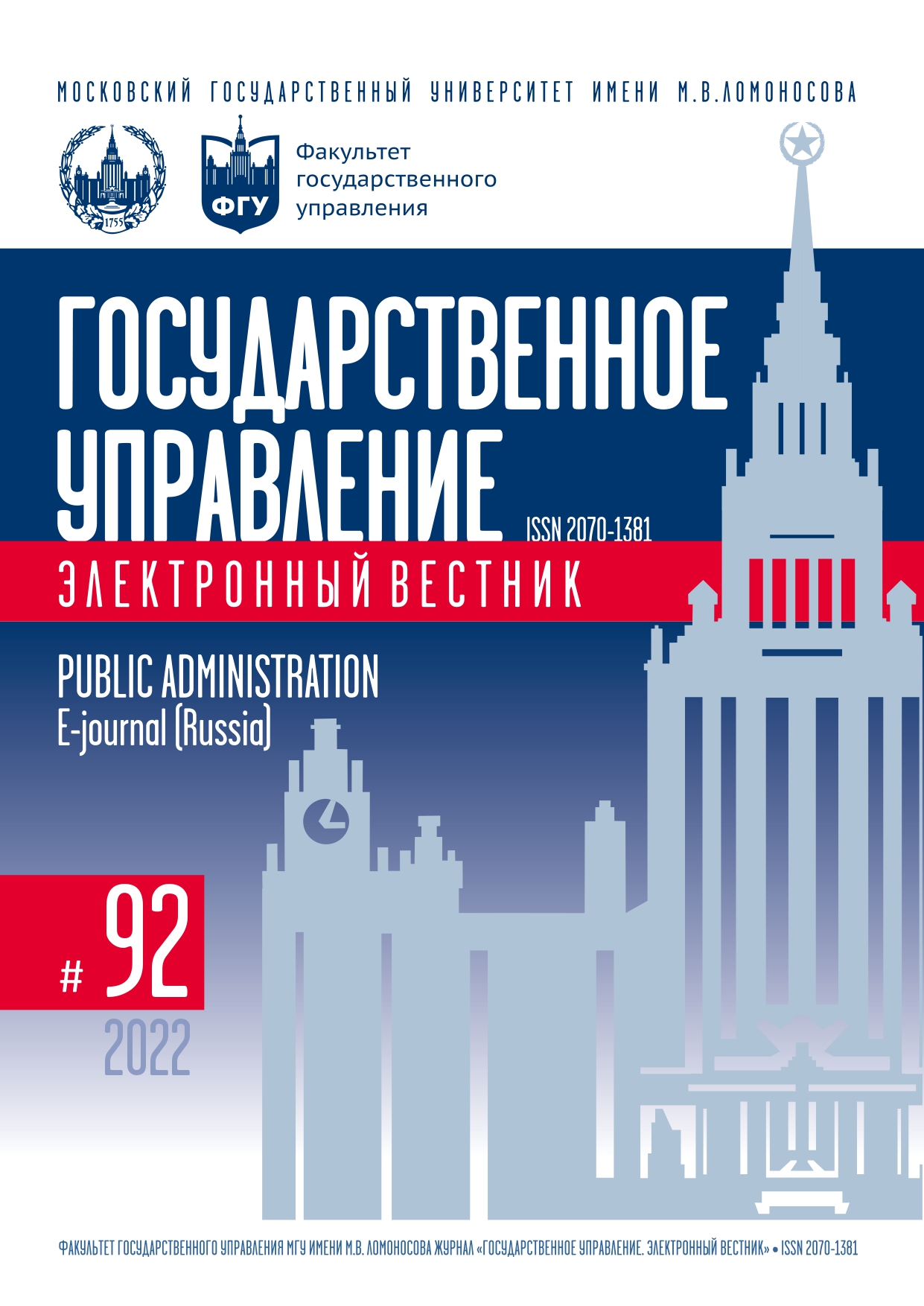Reproduction of Human Potential in Changing Conditions of Higher Education
Keywords:
Human potential, system of higher education, scientific staff, personal and qualification factors, training foreign studentsAbstract
The article examines the role of education in accumulating human potential in the context of transition to Industry 4.0, substantiates the timeliness of intensifying those areas of university functioning that are more in demand for training highly qualified specialists, taking into account international educational priorities and the needs of the modern labour market. Up-to-date information on the results of the work of higher educational institutions in Russia in dynamics for the period from 2010 to 2020 (admission, student population, graduation) is presented. The issues of functioning of postgraduate and doctoral studies, which are of key importance for the activities of Russian higher education, are analysed. Features of institutions of higher professional education work in the sphere of foreign citizens reception, the importance of methodological and practical work on their adaptation to create favourable conditions for studying in Russia are considered. Based on the analysis of information sources, the extent of distribution of additional forms of training and advanced training has been identified. The presence of youth interest in continuing education, mastering new professions, the need for which increases in the transforming economic conditions, has been established. Measures to focus efforts on the fundamental vectors of human development are proposed. It is concluded that it is important to revise the structure of students training in universities in order to better take into account predictive estimates of socio-economic and demographic indicators in the long term. One of the directions for further research may be the preparation of recommendations for improving the mechanism for setting admission targets and coordinating recruitment plans in areas (profiles) of training students with potential employers in order to achieve compliance with the demand for specialists from regional and international labour markets.
References
Грузина Ю.М., Харчилава Х.П. Развитие человеческого капитала в высокотехнологичных и наукоемких отраслях экономики // Гуманитарные науки. Вестник Финансового университета. 2021. Т. 11. № 6. С. 62–66. DOI: 10.26794/2226-7867-2021-11-6-62-66
Гусев А.Б. Круглый стол «Роль аспирантуры в воспроизводстве научных кадров» // Управление наукой и наукометрия. 2015. Т. 10. № 1. С. 196–224.
Иванов О.И. Человеческий потенциал (формирование, развитие, использование). СПб.: Скифия-принт, 2013.
Лосева О.В., Абдикеев Н.М. Концепция человеческого интеллектуального капитала в условиях цифровизации экономики // Экономика. Налоги. Право. 2021. Т. 14. № 2. С. 72–83. DOI: 10.26794/1999-849X- 2021-14-2-72-83
Ореховская Н.А. Сегодняшние стратегические тренды высшего образования для подготовки профессиональной элиты будущего // Гуманитарные науки. Вестник Финансового университета. 2021. Т. 11. № 4. С. 24–29. DOI: 10.26794/2226-7867-2021-11-4-24-29
Салин П.Б. Методологические основы политической социализации обучающихся в Российской Федерации иностранных студентов // Гуманитарные науки. Вестник Финансового университета. 2021. Т. 11. № 1. С. 72–76. DOI: 10.26794/2226-7867-2021-11-1-72-76
Соболева И.В. Человеческий потенциал российской экономики: проблема сохранения и развития. М.: Наука. 2007.
Стиглиц Д., Сен А., Фитусси Ж.-П. Неверно оценивая нашу жизнь: Почему ВВП не имеет смысла? Доклад Комиссии по измерению эффективности экономики и социального прогресса. М.: Изд-во Института Гайдара, 2016.
Федотов А.А. Качество жизни и человеческий потенциал в концепциях устойчивого и человеческого развития (часть первая) // Народонаселение. 2021. Т. 24. № 2. С. 53–65 DOI: 10.19181/population.2021.24.2.5
Флорида Р. Креативный класс: люди, которые меняют будущее. М.: Классика-XXI, 2007.
Человеческий капитал: содержание и виды, оценка и стимулирование / под общ. ред. д.э.н., профессора В.Т. Смирнова. М.: Машиностроение-1, Орел: ОрелГТУ, 2005.
Nelson R.R. Economic Development as an Evolutionary Process // Handbook of Alternative Theories of Economic Development / ed. by E. Reinert, R. Kattel, J. Ghosh. Cheltenham; Northampton: Edward Elgar, 2015. P. 323–335.
Sala H., Silva J.I. Labor Productivity and Vocational Training: Evidence from Europe // Journal of Productivity Analysis. 2013. Vol. 40. Is. 1. P. 31–41. DOI: 10.1007/s11123-012-0304-0
Sen A. Development: Which Way Now? // The Economic Journal. 1983. Vol. 93. Is. 372. P. 745–762. DOI: 10.2307/2232744
Downloads
Published
Most read articles by the same author(s)
- Igor N. Molchanov, Natalia P. Molchanova, State Financial Policy of Russia: Features of Development and Implementation in New Geopolitical Conditions , Public Administration. E-journal (Russia): No. 100 (2023)
Similar Articles
- Igor N. Molchanov, Human Potential and Prospects for Education Development , Public Administration. E-journal (Russia): No. 89 (2021)
- Gulnaz R. Yunusova, Human Capital in the Development of Region’s Economy: High-Quality Higher Education as Investment in Human Capital , Public Administration. E-journal (Russia): No. 88 (2021)
- Anna М. Ryabinina , Export of Educational Services in the Global Education Market , Public Administration. E-journal (Russia): No. 85 (2021)
- Gulnaz R. Yunusova, University Quality Management System as an Objective Condition for the Development of the Regional Economy: Foreign Experience , Public Administration. E-journal (Russia): No. 85 (2021)
- Igor N. Molchanov, Education and Economic Growth: The Present and a Look into the Future , Public Administration. E-journal (Russia): No. 108 (2025)
- Vera S. Shkarina, Intellectual Capital and Management System in Creative Economy Organizations , Public Administration. E-journal (Russia): No. 106 (2024)
- Eugenia V. Andryushina, Prospects for the Formation of Russian-Centric Model of Higher Education , Public Administration. E-journal (Russia): No. 104 (2024)
- Anna М. Ryabinina, Trends in Academic Mobility in the Context of the COVID-19 Pandemic on the Example of Lomonosov Moscow State University , Public Administration. E-journal (Russia): No. 92 (2022)
- Maria I. Bubnova, Alsu H. Tezyel, Specifics of Organizing Educational Process in the Context of Internationalization (Case Study of Chinese Students of the School of Public Administration, Lomonosov Moscow State University) , Public Administration. E-journal (Russia): No. 106 (2024)
- Tatiana V . Zaytseva, Anna A. Suvorova, Motivational Factors for Writing and Defending Scientific Papers , Public Administration. E-journal (Russia): No. 96 (2023)
You may also start an advanced similarity search for this article.




